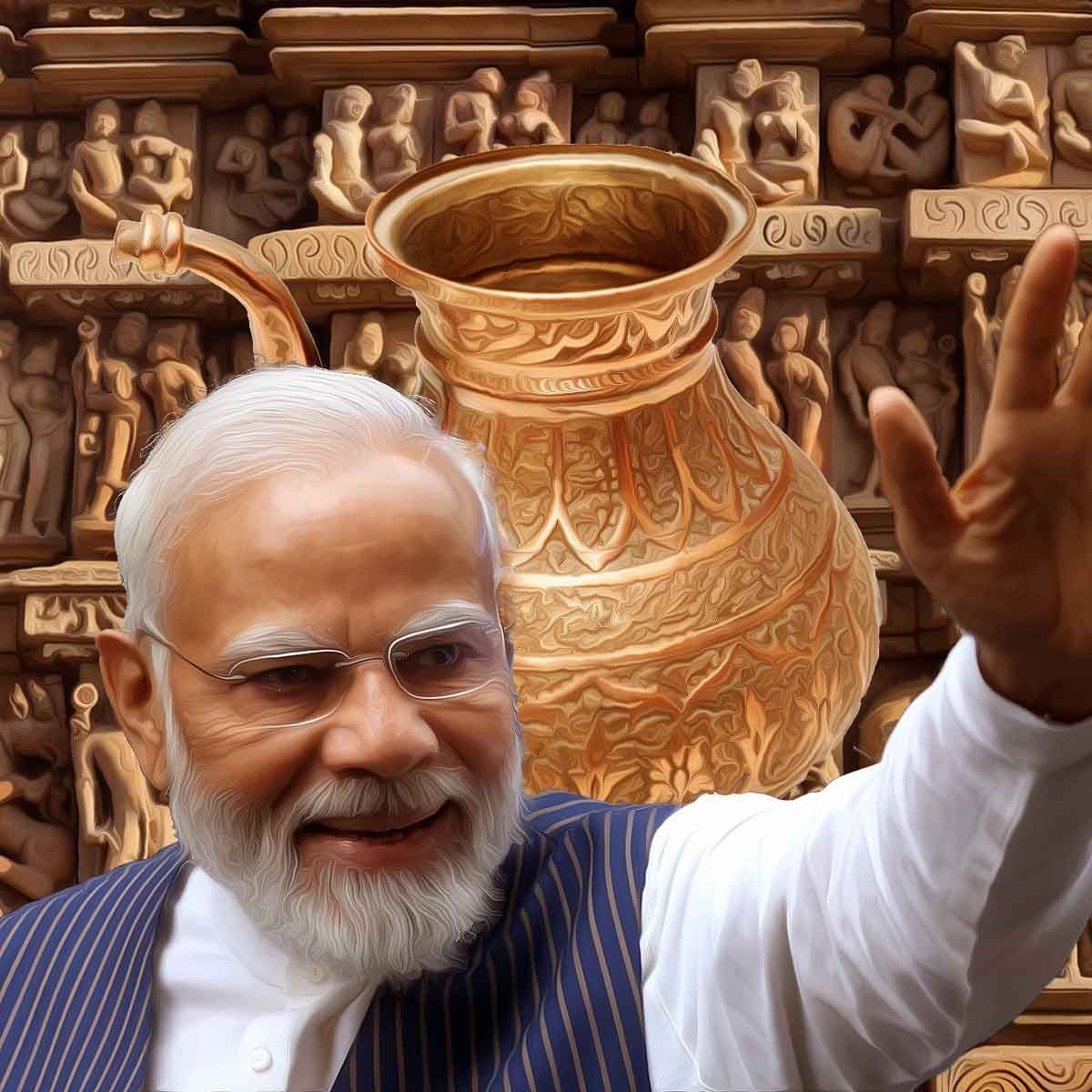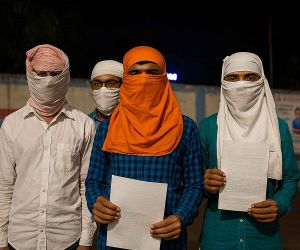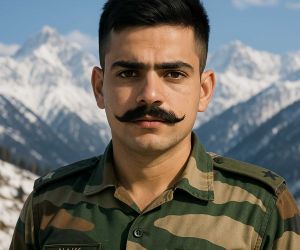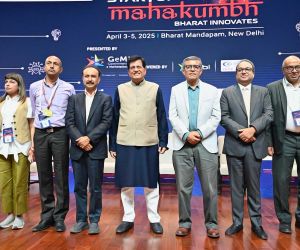MORE COVERAGE
Twitter Coverage
Satyaagrah
Written on
Satyaagrah
Written on
Satyaagrah
Written on
Satyaagrah
Written on
Satyaagrah
Written on
JOIN SATYAAGRAH SOCIAL MEDIA
India's audacious tryst with the cosmos continues as Chandrayaan-3 flawlessly kisses the Moon's South Pole, a precise Nataraja dance of science, ambition, and national pride, this milestone heralds a new dawn in lunar exploration, Bravo ISRO 🌒🚀
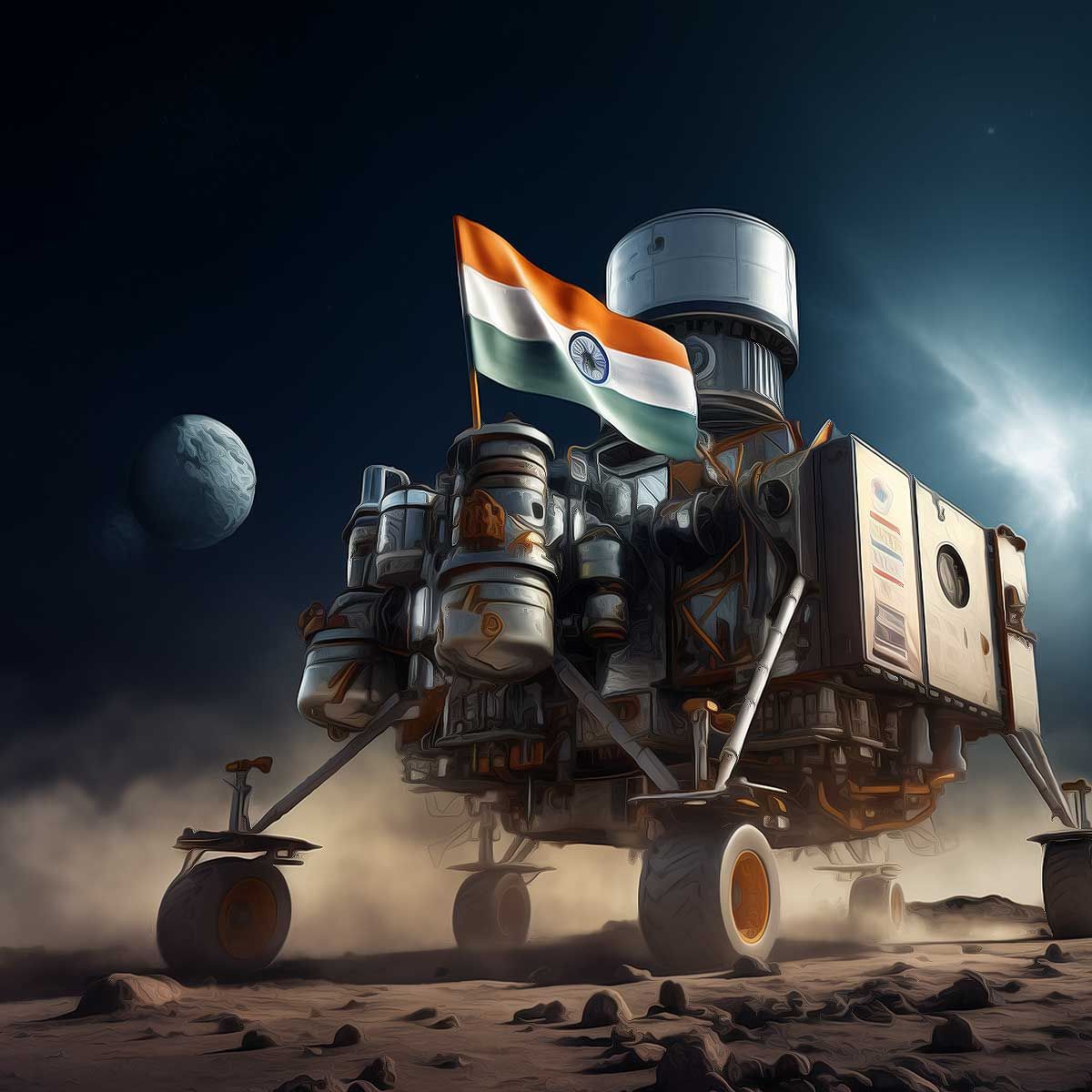
In an unparalleled feat, India has scripted a celestial saga that has left the world in awe. On Wednesday, August 23, at precisely 6:04 PM, the nation etched its name on the forbidding South Pole of the Moon, a feat no nation has ever accomplished.
This monumental moment represented not just a technological marvel but also the culmination of 1.4 billion fervent hopes, as ISRO's Chandrayaan 3 mission executed a flawless soft landing at its designated spot.
The meticulous precision with which the entire sequence unfolded was reminiscent of a masterfully crafted symphony. As ISRO announced, the Vikram Lander module embarked on its descent, separating from the Propulsion Module at 5:44 PM, and gracefully landed on the Moon's surface. This achievement doesn't just resonate with technological brilliance but is also symbolic of India's indomitable spirit, making us the first nation to mark our presence on the Moon's south pole.
While drawing parallels with its predecessor, Chandrayaan 2, ISRO emphasized that the Chandrayaan 3's landing mirrored the former. Yet, what distinguished this mission was the resilient design of the lander module, which was meticulously crafted to handle unforeseen challenges.
The mission's most heart-stopping phase, the rough braking, was executed to perfection. The Lander Module, initially traveling at a speed of over 6000 km/h, decelerated smoothly to about 1000 km/h. Throughout this phase, its altitude seamlessly transitioned from an astounding 30 km to a mere 8 km above the lunar surface. Truly, a testimony to India's unmatched prowess in space exploration.
Seemingly dancing through the vast expanse of space, the Lander Module sailed effortlessly through the attitude-holding phase. Its descent, a testament to India's pioneering space technology, was further exemplified in the Fine Braking phase. In a mere 3 minutes, the Lander's altitude was gracefully lowered to just 800 meters above the Moon's enigmatic surface.
In the concluding phase, the Vertical Descent, every heartbeat synced with the Lander's descent. As it smoothly transitioned through the local navigation stage, the nation erupted in jubilation – India had once again imprinted its name in the annals of space history.
An Odyssey of Precision and Innovation The triumph of Chandrayaan 3 wasn't accidental. Behind this success was the tireless dedication and meticulous planning of ISRO's brilliant minds. Reflecting on the bittersweet journey of Chandrayaan-2, lessons were imbibed and translated into unparalleled innovation.
This commitment to precision was evident in ISRO's revamped approach to the Vikram Lander for Chandrayaan 3. As elucidated by S. Somanath, the Chairman of ISRO, the new lander was an engineering marvel. He revealed to the press, "It was designed so robustly that even if every landing sensor malfunctioned, the lander would still achieve a soft landing."
Choosing the right spot on the challenging terrain of the Moon’s south pole was no small feat. Yet, after rigorous scouting and analysis, ISRO pinpointed the perfect landing site. Foregoing the initial plan to land on August 27, the team, trusting their expertise and the culmination of their efforts, chose to make history today. And so, they did.
|
|
Harnessing the Power of the Future: AI at the Helm
Upon the Vikram Lander Module reaching its destined orbit around the Moon, an era-defining moment unfolded. ISRO unleashed the prowess of the Automatic Landing System (ALS), a testament to India's foresight in integrating Artificial Intelligence (AI) into its space ambitions. Following the initiation of ALS, the Lander detached from the propulsion module, embarking on its descent through four intricately planned stages.
Throughout these stages, the Lander Module's propulsion mechanisms and throttleable engines worked in harmony, seamlessly maneuvering the module into a vertical alignment with the Moon's surface. These engines doubled up as braking systems, cushioning the Lander's descent and preventing any disastrous impact.
This dazzling choreography of space wasn't governed by the scientists sitting miles away on Earth. Instead, state-of-the-art AI and Machine Learning (ML) algorithms, conceived and perfected by the brain trust at ISRO, took the reins. Upon activation of the ALS, the fate of the Vikram Lander was entrusted entirely to the intricate web of sensors, cutting-edge camera arrays, and those very AI algorithms.
The culmination was nothing short of miraculous. At precisely 6:04 PM, after an array of masterfully executed descent maneuvers, Chandrayaan-3's soft landing was etched into the annals of history. The mission's next chapter awaits as the 'Pragyan' rover prepares to embark on its lunar exploration, unveiling secrets of the celestial body.
In achieving this monumental feat, India didn't just write its own chapter, but carved its legacy on the lunar script. Before this defining Wednesday, only giants like the US, Russia, and China had tasted success on lunar soil. But none had dared or achieved the audacity of landing in the enigmatic realm of the Moon's southern polar region. As India steps into this elite cadre, it does so with unparalleled pride, innovation, and a beacon of inspiration for the world.
|
|
An Epoch-Making Descent: Chandrayaan-3’s Triumphant Touchdown
The final, heart-stopping moments of Chandrayaan-3’s journey began unfolding from 5:20 PM on that fateful Wednesday. The mission was transitioning into its most critical phase, marking the beginning of a meticulously choreographed descent to the Moon's unforgiving surface. The complexity of a “soft landing” is unparalleled—it demands precision, ensuring a gentle and calculated descent that safeguards the spacecraft's delicate systems. And like the climax of an epic, at 6:04 PM, Chandrayaan-3 etched its name in lunar soil.
ISRO's official handle, bursting with pride and echoing the sentiments of a billion souls, announced to the world, “Chandrayaan-3 Mission: ‘India, I reached my destination and you too.'"
Initiated on July 14, this lunar odyssey comprised three intricate components: the Vikram lander, the Pragyan rover, and an indispensable propulsion module. The culmination of their concerted efforts came to the fore when, post-separation from the propulsion module on August 17, the lander and its companion, the rover, executed their joint endeavor to grace the lunar terrain.
The rover, christened ‘Pragyan’ - a poetic nod to wisdom in Sanskrit - is not just a piece of machinery. Weighing in at 26 kilograms, it's a culmination of human ingenuity, equipped with a suite of specialized tools for its mission. Operating for a singular lunar day—equivalent to a fortnight on our Earthly calendar—it is set to unravel myriad lunar secrets.
Armed with the state-of-the-art laser-induced breakdown spectroscope (LIBS) propulsion module, Pragyan embarks on an analytical quest, deciphering the moon's chemical and mineralogical tales. Complementing this, the rover also boasts the Alpha Particle X-ray Spectrometer (APXS), a device poised to delve deep into the elemental stories etched in lunar rocks and the soil that surrounds its landing site. This isn't just a mission—it's India's heartfelt ode to space exploration and our timeless pursuit of knowledge.
|
|
Resilience and Revelations: India's Return to the Moon
In the audacious realm of space exploration, setbacks aren't defeats but stepping stones. While Russia's Luna-25 experienced a tragic crash during its Moon’s South Pole landing attempt last Sunday, it underscores the intricate challenges that come with pioneering ventures. India, too, once faced its share of adversities with Chandrayaan-2 grappling with a technical glitch that disrupted its landing two years ago. But, in the indomitable spirit that India embodies, we rallied, regrouped, and refocused, ensuring that Chandrayaan-3's approach was not just foolproof but monumental.
Ever since Chandrayaan-1’s maiden voyage in 2008 unveiled hints of water molecules on the lunar southern pole, the world’s gaze has been firmly fixed on this enigmatic region. Beyond the allure of exploration, the very possibility of water presence on the Moon has transformative implications. It can pave the way for future interplanetary expeditions, offering clues into the Moon’s rich past—from tales of dormant volcanoes to vestiges of prehistoric oceans.
The potential treasures the moon’s south polar region harbors go beyond mere hydration. Water could be pivotal for multiple operational aspects, ranging from potable sources to advanced equipment cooling. The promise doesn't stop at H2O; the region might be a trove of other volatile substances, perhaps methane or ammonia. As we pry into the southern pole's mysteries, we may very well be looking back in time, understanding the earliest epochs of our solar system.
Highlighting the importance of this lunar destination, both the United States and China have charted their own journeys to explore the Moon’s southern pole. It's evident that while the allure of space is infinite, certain corners, like the Moon’s south pole, possess a unique blend of intrigue and promise. As Chandrayaan-3 makes its mark, India stands tall, pioneering a path filled with curiosity, courage, and cosmic wonder.
India's foray into space, illuminated by Chandrayaan 3's success, has once again showcased its ambition, perseverance, and technical prowess. With the most challenging part of Chandrayaan 3 now behind us, it's the turn of Pragyan, our indigenously designed lunar rover, to unravel the moon's enigmas.
|
As Pragyan embarks on its 14-day mission, it does more than just tread on lunar soil; it carries with it India's dreams and aspirations. Its mandate is vast: from studying the moon's topography and atmosphere to scouting for essential minerals. Among its most prized quests is the search for Helium-3, a potential treasure trove that promises clean energy for generations. If harnessed, this could radically alter our energy paradigm, ensuring sustainability and environmental well-being. Concurrently, the rover's hunt for water ice stands crucial for future cosmic ventures, especially as we aim to bridge the interstellar divide.
Gazing Towards the Sun | But the universe beckons, and our celestial curiosities don't end with the moon. With Chandrayaan 3's Vikram Lander gracefully marking its lunar legacy, ISRO is already setting its sights skyward, this time toward the heart of our solar system: the Sun.
ISRO's forthcoming mission, the Aditya-L1, signals India's maiden venture to study our star. Positioned at the vanguard of astronomical exploration, this space-based Sun observatory is gearing up for its launch, with the satellite already dispatched to Sriharikota, its celestial gateway. Slated for a launch in the imminent weeks, Aditya-L1 will further cement India's position in the global space community.
To Infinity and Beyond Every chapter of India's space narrative, from Chandrayaan 3's lunar embrace to the upcoming rendezvous with the Sun, reflects a nation driven by determination, innovation, and an insatiable quest for knowledge. As we celebrate our triumphs and anticipate the future, one thing stands clear: India's space odyssey is just taking flight, with galaxies of possibilities awaiting exploration. Today, as we bask in the lunar glow and set our sights on the solar horizon, we recognize that for India, the sky isn't the limit; it's merely the beginning.
 Support Us
Support Us
Satyagraha was born from the heart of our land, with an undying aim to unveil the true essence of Bharat. It seeks to illuminate the hidden tales of our valiant freedom fighters and the rich chronicles that haven't yet sung their complete melody in the mainstream.
While platforms like NDTV and 'The Wire' effortlessly garner funds under the banner of safeguarding democracy, we at Satyagraha walk a different path. Our strength and resonance come from you. In this journey to weave a stronger Bharat, every little contribution amplifies our voice. Let's come together, contribute as you can, and champion the true spirit of our nation.
 |  |  |
| ICICI Bank of Satyaagrah | Razorpay Bank of Satyaagrah | PayPal Bank of Satyaagrah - For International Payments |
If all above doesn't work, then try the LINK below:
Please share the article on other platforms
DISCLAIMER: The author is solely responsible for the views expressed in this article. The author carries the responsibility for citing and/or licensing of images utilized within the text. The website also frequently uses non-commercial images for representational purposes only in line with the article. We are not responsible for the authenticity of such images. If some images have a copyright issue, we request the person/entity to contact us at satyaagrahindia@gmail.com and we will take the necessary actions to resolve the issue.
Related Articles
- "Historic launch of Chandrayaan-3": A lunar mission set to make India the fourth nation to land on the moon, encompassing technological marvel, scientific discovery, and national pride, carving out India's place in the annals of space exploration
- "Ambition is path to success. Persistence is the vehicle you arrive in": India scripted history as ISRO successfully launches 36 OneWeb broadband satellites in heaviest LVM3-M2 rocket on its debut commercial mission, all satellites separated successfully
- "There is no law except the law that there is no law": Samudrayaan with Matsya 6000 is set to unlock the ocean's enigmatic heart, heralding a new era in harnessing marine resources for a sustainable future symbolizing a big leap in deep-sea exploration
- "Story of India’s herculean scuffle to get the Cryogenic Engine": India's heavy lift ambitions and ultra-low-cost model could put the likes of NASA out of business, an eventuality that the USA tried to delay India’s space program as long as it can
- "India's cosmic journey: From moonbeams to sunrays": ISRO's landmark Aditya-L1 mission set to launch, promising 24x7 Sun surveillance, aiming to decode solar mysteries, it will enhance our understanding of space weather and the profound Sun-Earth dynamics
- ISRO successfully tested the Gaganyaan Service Module Propulsion System (SMPS) on July 19, 2023 at ISRO Propulsion Complex (IPRC) , Mahendragiri
- "Cosmic camaraderie": India and Russia's space partnership ignites after Chandrayaan-3's lunar triumph, a legacy of cosmic camaraderie—from Aryabhata to Gaganyaan—heralds a new era of interstellar collaboration and boundless cosmic possibilities
- "In a monumental stride, Bharat ancient roots meet its space-age achievements under Modi": With 'Angad's footstep' on the Moon and landmarks named 'Shiv Shakti' & 'Tiranga', the nation beams with pride as Aug 23 is now immortalized as National Space Day
- "It is not enough to stare up the steps, we must step up the stairs": On 2nd April 2023, Vikram Sarabhai Space Centre (ISRO) at Thiruvanthapuram, IAF "Chinook" helicopter lifted an aircraft and left it in the sky to fly for high-speed unmanned landing
- "And the winds and the waves are always on the side of the ablest navigators": ISRO successfully launched GSLV-F12/NVS-01 Mission from SDSC-SHAR, Sriharikota, NVS-01 first of the India's second-generation NavIC satellites that accompany enhanced features
- "Trapping a Scientist": A Kerala cop maliciously framed ISRO scientist Nambi Narayanan in an espionage case after a Maldivian woman rejected his advances, leading to intense surveillance of innocents, and a Supreme Court-mandated Rs 50 lakh compensation
- "Research is creating new knowledge, without which there is no progress": National Research Foundation - a visionary initiative by the Indian govt aimed at centralizing funding for scientific & academic research with an ambitious target of ₹50,000 crore
- Film critics and a section of ‘secular’ personalities condemned Nambi being portrayed as a devout ‘Hindu’ in "Rocketry: The Nambi Effect", ex-ISRO scientist Nambi Narayanan lashes out at detractors, “Is it a sin to be a Hindu? Is it a sin to be a Brahmin?
- "Neglect will drive a noble mind to depart for another land": Brilliant mind - Dr Subhash Mukhopadhyay who created India's first and world's second test tube baby 'Durga' in 1978 with the help of some general equipment and refrigerator was punished for it
- "Achievement in space, politics on Earth": While ISRO's Chandrayaan-3 etches a new chapter in space history, the Congress's rush for credit speaks volumes, amidst lunar triumphs, memories of overlooked funding pleas during the UPA era cast long shadows

















